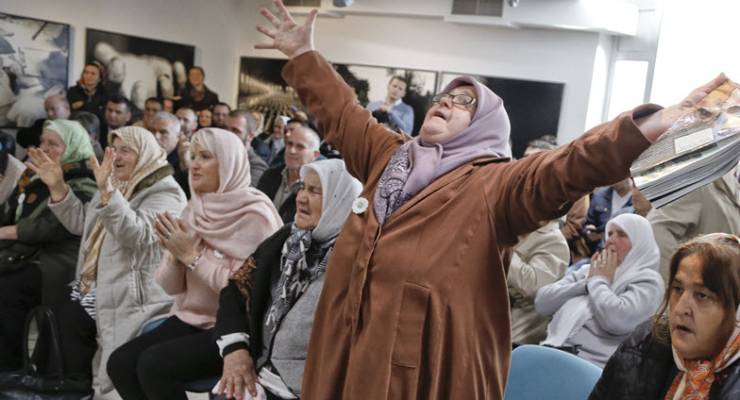
The International Criminal Tribunal for the former Yugoslavia (ICTY) had already been in place for over two years before the horrors of Srebrenica in May 1995. The Army of Republika Srpska rounded up more than 8000 Bosniak (Bosnian Muslim) men and boys from the small town in a UN “safe zone” in Bosnia’s east and slaughtered them, while a nearby peacekeeping force scrawled pornographic cartoons and racial slurs on their barrack walls. Remains are still being found, and funerals are still being held.
Meanwhile, the siege of Sarajevo had been going for roughly a year before the tribunal was established, starting in 1992 and continuing into 1996 — a civilian population blocked in and battered daily with hundreds of shells; their markets blown apart, their national library burnt down. Both the massacre of Srebrenica and the siege were led, in whole or part, by Army of Republika Srpska chief of staff Ratko Mladic, who overnight was convicted by the ICTY of genocide and war crimes, and will now die in prison. His life sentence follows that of Radovan Karadzic, the president of Republika Srpska during the Bosnian War. These are the last high-profile cases to be dealt with by the ICTY, the international community’s first attempt since World War II to collectively punish war crimes.
As the tribunal winds down, Kevin Boreham, lecturer in international law at the Australian National University, said the tribunal’s record was mixed.
“The trial of [former president of Serbia Slobodan] Milosevic was too slow and the prosecutor piled on too many charges, so that was a mismanagement,” he said. Milosevic died in March 2006, a few months before his verdict was due.
“But the process has been generally beneficial in a couple of ways — the relatives of those killed in Srebrenica have expressed the feeling that justice has been served. And second, the tribunal, particularly through the trials of [war criminal Dusko] Tadic has established a lot of important points for international criminal law. So we’ve seen some moral and legal benefits.”
Dr Grant Niemann, now a senior lecturer in law at Flinders University, was the first senior trial attorney of the ICTY, and worked with the tribunal from 1994 to 2000.
“It was a struggle at first, because these people weren’t being arrested and evidence was hard to come by, but things eventually ramped up, and I think it was ultimately very successful,” he told Crikey.
Along with the death of Milosevic, the highest ranking officials to be convicted of war crimes prior to Karadzic and Mladic — former Republika Srpska president Biljana Plavsic, and Serb Democratic Party co-founder Momcilo Krajisnik — are already free. Others have seen their convictions overturned on appeal.
“It’s a little different, Karadzic and Mladic were much more directly involved, and Mladic was a fugitive for many years, while Plavsic more or less surrendered, and admitted her wrong doing. That makes a difference,” Niemann said.
“It’s important to note than an appeal, even a successful one, isn’t an indictment of the process,” said Boreham .
Boreham said the legacy of the ICTY would be the precedents it set for international criminal law, something that could well become relevant regarding modern calamities like those taking place in Syria.
“There’s now a large body of international criminal law that can be applied in the future,” he said. “The UN general assembly have already put in place mechanisms to begin assembling material on the events on Syria.”
“I think the tribunal shows that it can happen. After Nuremberg, there were so many atrocities committed — in Cambodia, in Uganda, I could go on and on — that went unpunished, these people think no one will do anything,” Niemann said. “Yugoslavia showed that the world can respond, can investigate, and can put these people behind bars.”








Does this mean that there is still a chance that, having practiced on this peccadillo, the really big war criminals like Dubya, bLIAR & the Rodent are next?
Nah, didn’t think so.
The judgement that convicted Mladic also exonerated Milosovic. He was not guilty and died in custody. I am disappointed to see Crikey behaving like the main stream media and repeating false assertions.